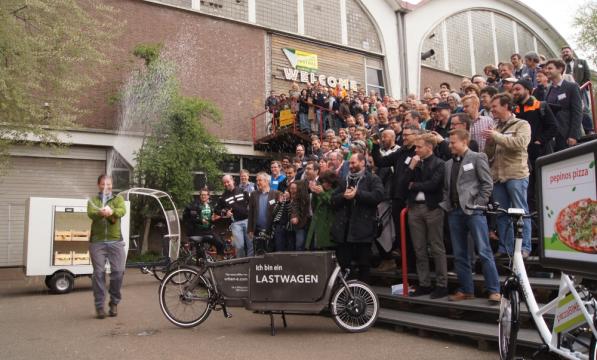It’s boom time for Cargo Bikes

The SUV for Intelligent Living
More and more companies understand that using bikes & cargo-bikes relieves congestion in cities and saves money. DHL Netherlands replaced 33 trucks with 33 cargo bikes, thus saving 152 metric tons of CO2 and € 430.000 per year. ‘In the Netherlands, 10% of all our vehicles are bikes’, said Arne Melse from DHL Netherlands. The trend is accelerating. From our pilots in four EU countries we see that, indeed, it is possible to deliver by cycle.’
The UK is one of DHL’s pilot countries, and by no means the only organisation interested in delivery by bike.
There are 2,000-3,000 cargo bikes today in London. We estimate that sales of cargo bikes will increase up to 20% in 2014.
Andrea Casalotti
importer of Chistiania cargo bikes in the UK
In fact it is a UK partner in the CycleLogistics project, Outspoken Delivery, that chaired the conference and helped to create the European Cycle Logistics Federation to bring together such a rapidly growing sector of logistics. The foundation of the European Cycle Logistics Federation (ECLF) with over 140 registered members mirrors strong support from industry and user groups around Europe.
What makes delivery by bike work?
‘Politicians are essential to secure funding for cycling infrastructure’ said Sjors Van Duren, Cycling Officer for the Arnhem & Nijmegen Region in the Netherlands. For the period 2010-2017, six cycle highways of 80 km will be completed with a budget of €55m. These ‘fast cycling routes’, allowing nearly 20km of unbroken journey by bike, along with development of electrically-assisted cargo bikes, is facilitating cycle deliveries on a bigger scale. ‘We are re-using existing infrastructure to extend bike lanes and reduce operational costs as much as possible, concluded Van Duren.
DHL spoke recently at a meeting in the European Parliament, reporting that town-centre restrictions on motorised vehicles helped them to bring forward their cycle-delivery models.In fact, bike delivery is extremely cost effective and the rise of e-commerce raises more demand for delivery in cities.

'It is boom time for cargo bikes. The big international companies like DHL and TNT are using bikes for deliveries, integrating them into their model. This is because up to 70% of delivery costs are in the last mile and they can save money and increase efficiency. Those companies also show that this is a credible solution for young businesses', says Dr. Randy Rzewnicki, ECF Project Manager for CycleLogistics.
'We are witnessing a shift in the industry. We need a strong European Cycle Logistics Federation in order to establish minimum standards for municipalities and industry, multiply our lobbying efforts in national and European level and provide extensive support for start-up companies', said Richard Armitage, funding Director of the ECLF.
Cycle Logistics Global Dream Team
One out of ten delegates at the ECLF conference were from start-up’s in the area of cycle service.
Three out of ten were successful cycle logistics operators who shared their knowledge and experiences. Representatives from the cycling industry, municipality officials and urban planners completed the mix of stakeholders, who together can bring cycling delivery to the next level.

The bulk of cycle logistics operators who attended the conference were small and medium size enterprises (SMEs). Johan Erlandson from Move by Bike, Sweden, highlighted: “We deliver more than 5000 newspapers daily by bike in Malmo, carrying an overall weight of over 600 kilos. Business is definitely growing”.
As proof of concept, the catering and delivery of the lunch at the conference was carried out entirely by cargo bikes!
The CTC has been happy to be part of the CycleLogistics project, supporting growth of delivery by bike in the UK and reminding individuals how easy it is to do their own shopping by bike. Running until May 2014 and spanning 12 countries, the EU-funded project CycleLogistics aims to reduce energy used in urban goods transport by replacing unnecessary motorised vehicles with bikes for intra-urban delivery and goods transport in Europe. The project has helped establish the Cycle Logistics Federation after recognising a demand for such an organisation. Information about the federation and the project is available at www.cyclelogistics.eu. The project receives funding from European Commission’s Intelligent Energy program.

